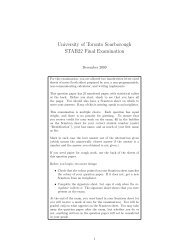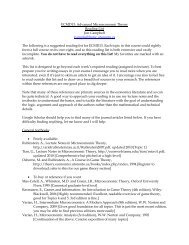Annual Review - University of Toronto Scarborough
Annual Review - University of Toronto Scarborough
Annual Review - University of Toronto Scarborough
You also want an ePaper? Increase the reach of your titles
YUMPU automatically turns print PDFs into web optimized ePapers that Google loves.
for a healthy PoPUlation<br />
Focusing<br />
on Mental<br />
Health<br />
oF The ToP 10 CoNTRIbUToRS to<br />
human disability worldwide, half<br />
involve mental health issues.<br />
Traditionally considered a minor<br />
contributor to overall physical wellbeing,<br />
mental health is now being<br />
recognized by scientists and clinicians<br />
as a pr<strong>of</strong>ound challenge all its own,<br />
a health priority that demands<br />
immediate and significant investment.<br />
This is why UTSC has mounted a<br />
concerted effort to become a leader<br />
in the field <strong>of</strong> clinical psychology,<br />
which employs a combination <strong>of</strong><br />
science, theory and clinical knowledge<br />
to help understand, prevent and<br />
relieve psychologically based distress<br />
and dysfunction.<br />
“we are building substantial strength<br />
in the most promising areas <strong>of</strong> clinical<br />
psychology research,” says Pr<strong>of</strong>essor<br />
John Bassili, Chair <strong>of</strong> the Psychology<br />
Department at UTSC. At the <strong>University</strong>’s<br />
Clinical Neurosciences Laboratory, for<br />
example, Pr<strong>of</strong>essor Anthony Ruocco<br />
uses advanced techniques in<br />
neuropsychology and cognitive<br />
neuroscience to investigate thought<br />
and emotional processes in people<br />
with severe psychiatric illness.<br />
In response to this growing need for<br />
more mental health pr<strong>of</strong>essionals,<br />
two years ago UTSC launched the<br />
innovative undergraduate Mental<br />
Health Studies (MHS) program, in which students can<br />
concentrate their course load on psychology courses<br />
relevant to mental health. And soon, UTSC will launch a<br />
brand-new doctoral program in clinical psychology. This<br />
groundbreaking PhD will provide a rigorous training ground<br />
for the next generation <strong>of</strong> researchers and practitioners <strong>of</strong><br />
clinical psychology, and a rich scholarly environment that<br />
will attract top experts in the field.<br />
To highlight these ambitious goals, the new doctoral<br />
program will be led by one <strong>of</strong> Canada’s most influential<br />
clinical and personality psychologists, Dr. Michael Bagby,<br />
who joins UTSC from the Centre for Addiction and Mental<br />
Health, where he was director <strong>of</strong> clinical research and senior<br />
scientist. Dr. Bagby has been named an Institute <strong>of</strong> Scientific<br />
Information “highly cited scientist,” a distinction held<br />
by only the top one per cent <strong>of</strong> scientists worldwide.<br />
“our clinical psychology group is <strong>of</strong> the highest calibre,”<br />
says Bassili, “and we never lose sight <strong>of</strong> the fact that<br />
scholarly excellence and scientific rigour are our top<br />
priorities. To lead the new PhD program, we desired<br />
someone with seniority and recognition that would define<br />
our commitment to the field. Dr. Bagby is a shining example<br />
<strong>of</strong> the kind <strong>of</strong> scholar who belongs at UTSC.”<br />
a n ‘a b n o r m a l’ a P P r o a c h<br />
UTSC’s new Mental Health Studies (MHS) program is proving<br />
incredibly popular with undergraduates. Just two years since it<br />
was launched, MHS has a healthy enrolment, and student interest<br />
shows no signs <strong>of</strong> slowing. The program <strong>of</strong>fers a specialist or major<br />
degree to students who wish to focus their studies on disorders<br />
that are considered psychologically “abnormal.” Students begin<br />
with a traditional psychology curriculum, but soon diversify into<br />
courses such as psychotherapy, psychological assessment and<br />
psychopharmacology.<br />
Driven by the growing societal awareness <strong>of</strong> the importance <strong>of</strong><br />
mental health and by UTSC’s top-notch faculty in the field, the MHS<br />
program is well aligned with the proposed doctoral curriculum in<br />
clinical psychology. “Mental Health Studies has been a great success,”<br />
says Pr<strong>of</strong>essor John Bassili, Chair <strong>of</strong> the Psychology Department at<br />
UTSC. “No other psychology department <strong>of</strong>fers a program with this<br />
thematic focus.” And in keeping with the <strong>University</strong>’s commitment to<br />
combining academic excellence with meaningful engagement, MHS<br />
also <strong>of</strong>fers a co-op option, in which students can take advantage <strong>of</strong><br />
UTSC’s strong partnerships with world-class mental health institutions.<br />
22 UNIVeRSITy oF ToRoNTo SCARBoRoUgH


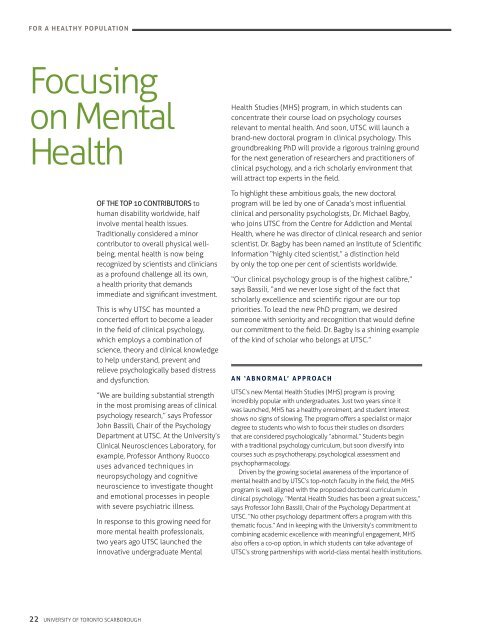
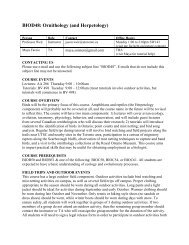
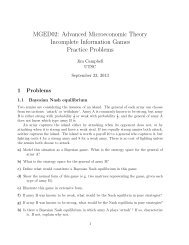

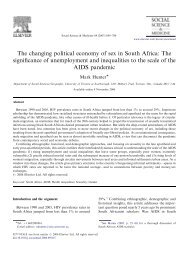
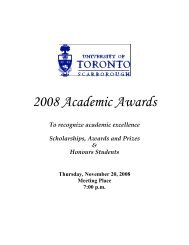

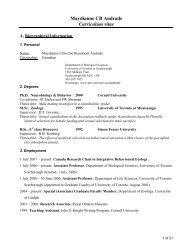
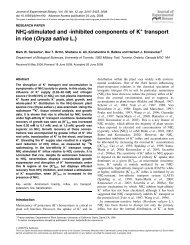
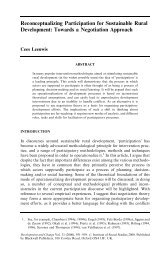
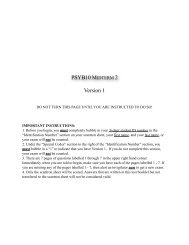
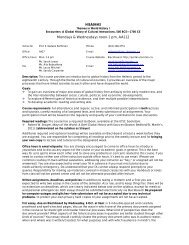
![[Enter course name - Syllabus] - University of Toronto Scarborough](https://img.yumpu.com/50068522/1/190x245/enter-course-name-syllabus-university-of-toronto-scarborough.jpg?quality=85)
